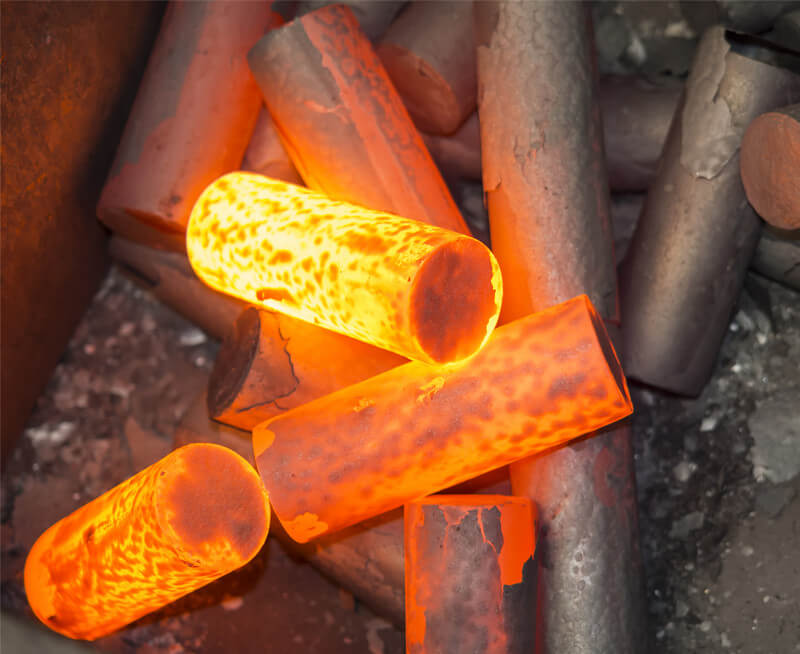
Forged Aluminum Suspension Arms: Technology for Reducing Automobiles’ Weight
December 30, 2020
These Are Common Applications Of Hot Forging
January 21, 2021Forging Materials: Learn About Forging Raw Materials Minute By Minute
Forging technology has grown big over the last few decades, with most manufacturing opting for producing products. The wide application of this technology is one of the reasons for its fast-growing popularity. The development and improvement of cold forging is another reason the technology is dominating the manufacturing industry.
The application of cold forging on a range of metals is another reason why it has grown popular with manufacturers. In this guide, we will be looking at some of the main raw materials that can be forged.
-
Steel
One of the metals that are widely forged is steel. This is one of the hardest metals in the industry in that it can withstand tough conditions. That is the reason why it is used for making parts of the machines used in rough conditions. In fact, due to its strength and hardness features, steel makes parts of large machines such as bodies and frames and cutter tools.
But the most forged steels are steel alloys. To make the pure steel harder or to achieve the desired features, steel is combined with other metals to produce a more powerful alloy. Some of the most forged steel alloys include:
- Carbon Steel – steel with carbon but no other alloy element
- Low alloy steel – steel with less than 5% alloy element
- Medium alloy steel – steel with total mass of 5% to 10% alloy element
- High alloy – alloy steel with higher than 10% of the alloy element
-
Aluminum alloys
In the recent past, there has been an increase in the forging of aluminum metal. The metal is very popular with cold because of the numerous benefits. Aluminum has good plasticity at room temperature compared to steel, making it ideal for cold forging. Other features of aluminum include high strength and corrosion resistance.
Aluminum alloys are the most forged metals. That’s because they offer better features than pure aluminum. Some are more hardened with other metals to produce harder products. Some of the used alloys include carbide and many others. Here are some of the most common aluminum alloys for forging:
- High-strength aluminum alloy
- Heat-resistant aluminum alloy
- Corrosion-resistant aluminum alloy
-
Copper Alloys
Copper alloys come with good properties that make them ideal for cold forging. Some of these properties include good mobility and processing. Copper alloys have high strength and toughness features that make them suitable for tough conditions. These alloys also have very good plasticity and excellent wear resistance. Last but not least of these properties is good high mechanical performance and thermal conductivity.
The forging temperature for most copper alloys ranges from 150 to 200 degrees C. This makes it possible to cold forge or hot forge them easily. There are so many types of copper alloys that are forged, but we are going to look at the major ones, and they includes:
- Brass
- Bronze
- White Copper
-
Titanium Alloy
Titanium is another metal that’s widely used in the forging processes. The metal has a number of properties that make it ideal for forging. Titanium’s high strength and corrosion resistance are some of the properties that make it ideal for. It also offers high resistance to high heat. The material is widely used for forming rods and rolling profiles.
There are many titanium alloys that are forged. Note that most of these alloys are mainly to improve on the limitation of titanium. Note pure titanium such as poor wear resistance and process performance. Some of the titanium alloys include:
- α Titanium (TA)
- β Titanium (TB)
- α and β titanium alloy (TC)
-
Magnesium Alloy
Magnesium alloys are another common forging raw material widely used in the manufacturing industry. Magnesium alloys come with properties such as high wear resistance and rigidity. The material is light in quality and produces incredible impact resistance. They’re also dimensionally stable and corrosion-resistant. Did you know that magnesium alloys have a higher resistance than iron and aluminum alloys? Now you know.
There many metals that can be combined with magnesium to form powerful metals. Some of the alloys used include aluminum, zinc, radon, vanadium, cadmium, and many others. These alloys can be for cold or hot forged, depending on the expected results. Here are the two most common magnesium alloys:
- Mg-Zn-Zr is a magnesium alloy
- Mg-Al-Zn is a magnesium alloy



